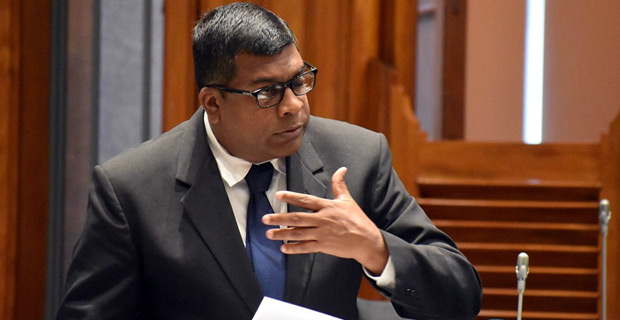Fiji: A strategic agricultural market for India
While at the moment Fiji lags in advance agricultural technologies, the island nation is emphasising on organic agriculture, a plastic-free environment, and dependency-free agriculture. In an exclusive interview with Media India Group, Mahendra Reddy, minister of agriculture, rural & maritime development, waterways & environment, Republic of Fiji, spoke about the promotion of renewable energy and shared his plans to promote agricultural trade between India and Fiji.
Can you please tell us about the tax exemptions policies of Fiji on green energy?
We are kind of promoting renewable energy primarily because- firstly, we know the negative impact of non-renewable energy and crude oil, in particular on the environment; secondly, because we are importing large volume of crude energy, so we are losing a lot of our producers and lastly, the renewable energy is quite cheap as long as we treat it as a public good and then we develop it at a large scale. So, we are promoting and making all renewable energy equipment like solar panels, etc. duty-free. There are also zones where if someone establishes say renewable energy power plants, they will be exempted from certain parts of the tax.
What steps are you taking to promote organic agriculture in the country?
At the moment we are developing. We don’t want to impose something without providing the alternative. We don’t want to, say, ban inorganic fertilisers because what’s the alternative? At the moment, we are developing the technique. Some people are coming to us saying that we want to develop it for you etc. Fair enough. But if we guarantee them that, we will ask the farmers to buy from them, and naturally they will raise up the price. So, we ask them to develop it and compete with others to sell it to the farmers. At the same time to set the desktop price, we are also developing it and we will also supply and at a much lower rate, but a limited volume because the government can’t get into that since the demand will be very high. So, we will develop it and supply the limited volume but we are encouraging the farmers to also develop their own organic fertilisers on a smaller scale. I have seen a farming let’s say in Sigatoka, Kulukulu where the farmer is making USD 50,000 net in a year and he is not using a single weedicide, pesticide or inorganic fertiliser. He has got a small poultry shed and uses all the poultry animals. He has got Gliricidia in his farm, which is a nitrogen plant. So, he cuts the leaves, put it in-ground, soaks it in the water and keeps it for about three to four weeks. Then he takes the water out and spreads it all over his field. He also plants ornamental plants around the farm which kind of keep the pests away. So, any pesticide, weedicide or herbicide he is using is organic. In that way he doesn’t use any pesticide or weedicide, his farm is totally organic but it hasn’t been certified because the adjacent farm is an inorganic pesticide supply. So, unless it’s an entire area that is organic, we can’t do the certification. It will take two to three years for us to start it.
What is the status of agricultural trade between India and Fiji?
In agriculture there are two things, one is trade and another is exchange. Fiji can benefit a lot from India as it is quite heavily technology-driven. India has invested a lot in training and education in technology. We have visited training institutions, research institutions, private institutions as well as government institutions. We even intend to submit proposals for India to send their experts down to spend time with us, train our staff, upskill our staff and meanwhile, they will also transfer knowledge. We are also looking for support in terms of machinery. Once the machinery is there then the private sector will also develop and expand, and they will create demand for Indian products. In the beginning, India will have to showcase their products through us and we are happy to get their products into our market and take it out to our customers. Fiji’s agriculture sector will expand and it will be commission agriculture where demand for technology-driven agriculture will be increasing. So, if India is able to get their products quickly into our markets, the demand for Indian machinery and Indian products will be there.
And when we talk about Fiji, we are also talking about the other 16 million out there in the entire region where Fiji is providing leadership to the entire region. Talking about bigger countries like Samoa, Papua New Guinea and Tonga where agriculture sector is the mainstream economy, they often follow Fiji and thus if there is any investment in Fiji in terms of technology, technical skills or know-hows there will be a demand that will be created from the region for this particular product and I do hope that India will take advantage of this.
In terms of trade, we are exploring the Indian market but in a different way. We have a branding of our products. Our products originate in a country where our environment is relatively cleaner and very pristine as compared to India and other economies and that’s how we see our market penetrating the Indian market. For example, timber products like coconut furniture which is highly sought after. However, at the moment we don’t have the means to meet the demand. For that, we need to expand our coconut plantations so that we can then supply the timber to the plant. We are looking at water and Kava (traditional Fijian beverage made from Piper methysticum, a plant native to the Pacific islands). We want Indians to consume Kava. We also have other products like ginger, which is quite known for its quality. Given the climatic conditions there, consumers in Australia and New Zealand tend to prefer our ginger in terms of taste and the contribution to the dishes that they make. So, we are already exporting the nearby markets. We are also looking at fish export which is also, at times, very well sought after.
Are you importing any crops from India?
We are importing pulses, basmati, spices and of course cotton for fabric.
Fiji is an island nation surrounded by the ocean all around. However, the plastic pollution in the oceans is increasing at an alarming rate. What is Fiji doing for treating this pollution?
All the plastic litter in the ocean comes from land-based litter. We have from last year imposed a tax on single-use-plastic which was a waste this year. From next year there will be a complete ban on single-use plastics. The reason we didn’t impose it from this year, is because we want to give time for the alternatives to come in and that has given rise to people coming up with non-plastic bags, which will be given to supermarkets. From next year, by law, there will be no single-use plastic. We are focusing on moral suasion, education, awareness and at the same time, we have raised fines for corporates and individuals who are littering in public places.











